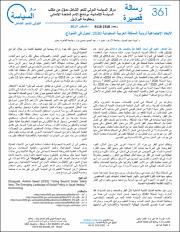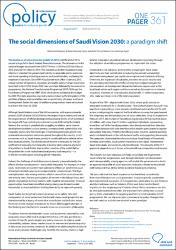Please use this identifier to cite or link to this item:
https://repositorio.ipea.gov.br/handle/11058/15066Files in This Item:
| File | Description | Size | Format | |
|---|---|---|---|---|
| ar_OP361AR_The_social_dimensions_of_Saudi_Vision_2030_a_paradigm_shift.pdf | 149.56 kB | Adobe PDF |  View/Open | |
| en_OP361_The_social_dimensions_of_Saudi_Vision_2030_a_paradigm_shift.pdf | 51.54 kB | Adobe PDF |  View/Open |
| Title: | The social dimensions of Saudi Vision 2030: a paradigm shift |
| Other Titles: | الأبعاد الإجتماعية لرؤية المملكة العربية السعودية 2030: تحول في النموذج |
| Authors: | Alsayyad, Amina Said Nawar, Abdel-Hameed |
| Abstract: | "The decline in oil prices from the middle of 2014 until the end of 2016 caused a huge fall in Saudi Arabia’s financial resources. The oil revenues in the national budget decreased from USD277 billion in 2014 to USD163 billion in 2015 and USD141 billion in 2016. This precipitous decline required pressing reforms to maintain the government’s ability to undertake public economic and social spending, including economic and social transfers, and being the employer of last resort. Since HRH King Salman took office in January 2015, a large number of legislative, regulatory and public policy changes have been launched. In April 2016, Vision 2030 was launched, followed by two executive programmes, the National Transformation Programme (NTP) 2020 and the Fiscal Balance Programme (FBP) 2020, which aimed to balance the budget by 2020. The state apparatus was restructured, including the integration of the portfolio of labour and social affairs into a new Ministry of Labour and Social Development. Earlier this year, 10 additional programmes were announced to achieve the vision by 2030". (...) |
| metadata.dc.rights.holder: | International Policy Centre for Inclusive Growth United Nations Development Programme |
| metadata.dc.rights.license: | O texto e dados desta publicação podem ser reproduzidos desde que as fontes sejam citadas. Reproduções com fins comerciais são proibidas. |
| metadata.dc.type: | One Pager |
| Appears in Collections: | Publicações do IPC-IG |
Items in DSpace are protected by copyright, with all rights reserved, unless otherwise indicated.

